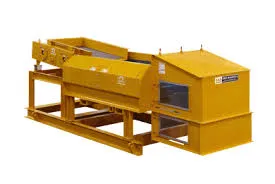

נוב . 17, 2024 07:52 Back to list
The Importance of Aluminium Can Shredders in Recycling
In today's world, where environmental concerns are at the forefront, recycling has become an essential practice that bridges the gap between waste management and resource conservation. Among the various materials that can be recycled, aluminium stands out due to its infinite recyclability and significant energy savings when processed. To effectively recycle aluminium, the role of aluminium can shredders is pivotal.
Aluminium can shredders are specialized machines designed to crush and shred aluminium cans into smaller pieces. The primary purpose of using these shredders in recycling operations is to facilitate the handling and processing of aluminium. Shredded aluminium cans are easier to transport, sort, and reprocess, making the recycling process more efficient.
One of the most noteworthy advantages of shredding aluminium cans is the space-saving aspect. When cans are shredded, they occupy significantly less space compared to their original form. This advantage is particularly important for recycling facilities, which often deal with limited space. The compacted material created by shredding can be easily stacked and transported to processing units, thereby reducing logistical costs and improving overall efficiency.
Additionally, shredding plays a crucial role in contamination removal. During the recycling process, aluminium cans may contain residues of the original product, such as food and beverages. By shredding the cans, these contaminants can be more easily removed in subsequent cleaning processes, ensuring that the final recycled product meets quality standards. This cleaner end product not only helps reduce waste but also improves the economic viability of recycling operations.

Energy efficiency is another critical aspect worthy of mention. Recycling aluminium saves up to 95% of the energy required to produce new aluminium from raw materials. Shredding aluminium cans allows for faster processing, which can significantly lower the energy consumption of the recycling operation. Moreover, smaller pieces of aluminium heat up and cool down more quickly during melting, further contributing to energy savings.
The implementation of aluminium can shredders also promotes a circular economy. By making it easier to recycle aluminium, these machines contribute to a system where materials are reused rather than discarded. This shift in mentality is essential for environmental sustainability, as it helps reduce the extraction of raw materials, lowers greenhouse gas emissions, and minimizes landfill waste.
Moreover, the growth of recycling markets worldwide has seen an increasing demand for efficient shredding solutions. Manufacturers are continually innovating and improving shredder technology to meet the diverse needs of recyclers. From mobile shredders that can be transported to various locations to large-scale industrial shredders designed for high-volume operations, the range of available shredding equipment is expanding, aligning with the rise of sustainability initiatives globally.
In conclusion, aluminium can shredders play a crucial role in the recycling process, from space saving and contamination removal to enhancing energy efficiency and promoting a circular economy. As society continues to prioritize environmental responsibility, the need for effective recycling practices will only increase. Investing in advanced aluminium can shredders not only fosters responsible waste management but also paves the way for a more sustainable future, where recycling becomes a standard practice in our daily lives. Embracing such technologies is imperative if we are to protect our planet and ensure that valuable resources are conserved for generations to come.
Latest news
Troubleshooting Common Eddy Separator Problems
NewsJul.04,2025
The Role of Metal Recycling Plants in Circular Economy
NewsJul.04,2025
The Impact of Recycling Line Pickers on Waste Management Costs
NewsJul.04,2025
Safety Features Every Metal Shredder Should Have
NewsJul.04,2025
How Industrial Shredders Improve Waste Management Systems
NewsJul.04,2025
How Cable Granulators Contribute to Sustainable Recycling
NewsJul.04,2025